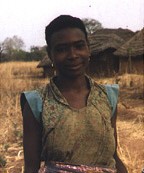Puku, Fakanchi in Nigeria

Photo Source:
Bethany World Prayer Center
|
Send Joshua Project a map of this people group.
|
| People Name: | Puku, Fakanchi |
| Country: | Nigeria |
| 10/40 Window: | Yes |
| Population: | 75,000 |
| World Population: | 75,000 |
| Primary Language: | Ut-Ma'in |
| Primary Religion: | Ethnic Religions |
| Christian Adherents: | 10.00 % |
| Evangelicals: | 6.00 % |
| Scripture: | Portions |
| Ministry Resources: | Yes |
| Jesus Film: | Yes |
| Audio Recordings: | Yes |
| People Cluster: | Benue |
| Affinity Bloc: | Sub-Saharan Peoples |
| Progress Level: |
|
Introduction / History
The Puku live in the Dalai and Fakai districts of Sokoto state, Nigeria. This area consists of sandy plains and steep-sided hills of rock. It is a well-watered region with a few rivers and many streams running through it. The Puku are one of the Plateau peoples of the Benue-Congo language family. They are closely related to the Bangawa and Dukawa peoples and share many cultural traits with them.
In the 1700s, war erupted between the kingdom of Kebbi and the people of Zamfara. The Puku became foot soldiers, bodyguards, and slaves for the Kebbi. Because of Zamfara attacks, the Puku and Kebbi left the region in which they lived. They soon established their own kingdom and became a strong fighting force against the Fulani slave raids that followed.
What Are Their Lives Like?
Most Puku work on small farms and raise some livestock. Guinea corn, rice, sweet potatoes, red peppers, cotton and tobacco are among the crops grown. The Puku are excellent farmers, using such tools as plows, hoes, axes and sickles. The women regularly collect forest products needed for food preparation, medicinal uses and other purposes. Some of these products include honey, locust beans, roots of certain plants, and various types of wood. They still hunt and fish, though these are not as important as they once were. Many specialize in such crafts as woodworking, weaving and pottery-making.
Puku compounds consist of round huts with mud walls and thatched roofs. Beds are also made of mud and raised off the ground. During cold weather, they build fires beneath their beds to stay warm. The compounds are very orderly, with firewood neatly stacked against the walls. Each compound includes a gatehouse, which is used to receive guests, store grain, and keep livestock.
When a Puku woman is pregnant, she must not eat certain foods, leave her hut at midday, or enter water for fear of evil spirits. When the child is born, neither parent may carry it. Rather, a young nurse holds the baby towards the mother when it needs to be fed.
When children reach the age of seven, they begin working. A boy is first given a small hoe and later is given a weapon to take hunting with his father. When he is strong enough to participate in wrestling matches, a boy is ushered into manhood in a special initiation ceremony. A girl helps her mother with household duties and tends to the younger children. Later, she will be taught the art of pottery-making.
Wrestling is an important activity for Puku males. Wrestling can be inter- or intra-village affairs, and each year, one champion wrestler is awarded a forked stick. For years to come, he will carry this stick over his shoulder.
What Are Their Beliefs?
A number of Puku have converted to Islam due to Hausa and Fulani influence, but most still practice their traditional religion. Cults are joined by both men and women, and they worship certain cult objects such as rocks or trees. Men offer prayers and sacrifices to their own personal gods, which are usually inanimate objects. They conduct certain rituals in conjunction with these prayers and sacrifices to ensure the growth of healthy crops or to prevent illnesses. A chief "rainmaker" prays to the gods to send rain, and the supreme being, Ashila, is addressed in times of crisis.
There are Christ followers among the Puku people who can share the love of Christ with Puku family leaders.
What Are Their Needs?
The Puku people are largely animistic. Their faith is in the spirit world rather than the all-powerful God of Creation who made the heavens and the earth.
Prayer Points
Pray for Christ followers among the Puku people to share the love of Christ with Puku family leaders.
Pray for spiritual hunger and a thirst for truth to affect every Puku family in Nigeria.
Pray that soon Puku disciples will make disciples of others.